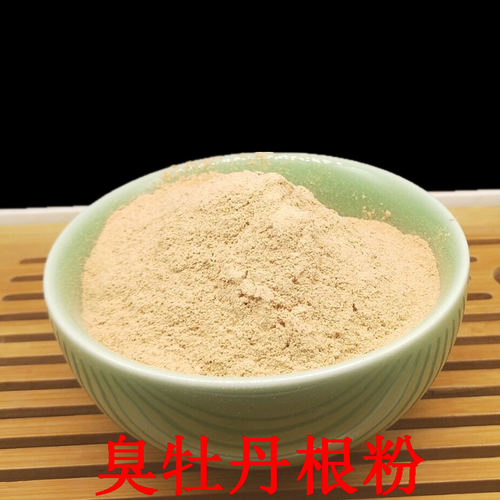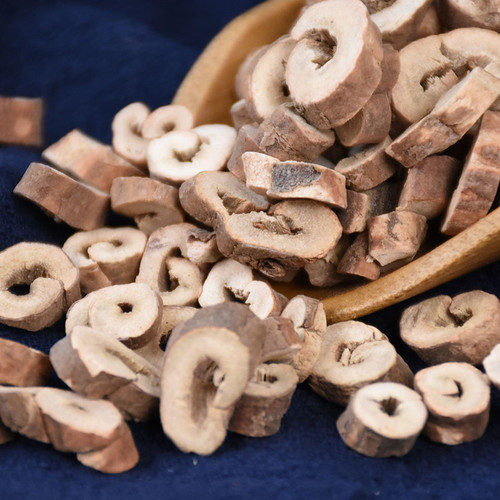Product Overview
Parts used: Root barks
TCM category: Herbs that cool the Blood
TCM nature: Cool
TCM taste(s): Bitter Pungent
Meridian affinity: Heart Kidney Liver
Scientific name: Paeonia suffruticosa
Other names: Moutan peony
Use of mudan peony bark (Mu Dan Pi) in TCM
Please note that you should never self-prescribe TCM ingredients. A TCM ingredient is almost never eaten on its own but as part of a formula containing several ingredients that act together. Please consult a professional TCM practitionner, they will be best able to guide you.
Preparation: Remove impurities, wash, soak in water, cut in thick slices and dry.
Dosage: 6-12 grams
Main actions according to TCM*: Cools the Blood, activates Blood circulation and resolves Blood stasis.
Primary conditions or symptoms for which mudan peony bark may be prescribed by TCM doctors*: Hematemesis Nosebleed Amenorrhea Dysmenorrhea Sores Carbuncles
Contraindications*: Not recommended for patients with weak Spleen and Stomach.
Common TCM formulas in which mudan peony bark are used*:
For Heat in the Stomach with symptoms of toothache, mouth sores, facial swellings, bad breath and dry mouth combine mudan peony bark with bugbane rhizomes (Sheng Ma), goldthread rhizomes (Huang Lian), unprepared rehmannia (Di Huang) and dong quai (Dang Gui).
For Blood Stagnation with symptoms of amenorrhea and dysmenorrhea combine mudan peony bark with peach kernels (Tao Ren), cinnamon twigs (Gui Zhi), red peony roots (Chi Shao) and poria-cocos mushrooms (Fu Ling).
For intestinal abscesses combine mudan peony bark with rhubarb (Da Huang) and peach kernels (Tao Ren).
For Blood-Heat, febrile illnesses, clouding of consciousness and/or exanthems combine mudan peony bark with woad leaves (Da Qing Ye), goldthread rhizomes (Huang Lian), cape jasmine fruits (Zhi Zi), red peony roots (Chi Shao) and bugbane rhizomes (Sheng Ma).
For dizziness, vertigo, deep-seated and hot pain in the bones, painful dysuria and/or edema combine mudan peony bark with water plantain (Ze Xie).
For intestinal abscesses combine mudan peony bark with wax gourd (Dong Gua) and rhubarb (Da Huang).
Key TCM concepts behind mudan peony bark (Mu Dan Pi)'s properties
In Traditional Chinese Medicine (TCM), mudan peony bark are plants that belong to the 'Herbs that cool the Blood' category. Herbs in this category are used to clear inflammatory and infectious conditions, referred to as 'Internal Heat' in TCM. This is why most of the herbs in this category will have both antibacterial and antiviral properties. In TCM one has too much 'Heat' in their body as a result of a deficiency of 'Yin' (which is Cold in nature, see our explanation on Yin and Yang) or, more commonly, an excess of Yang (Hot in nature). Herbs that cool the Blood treat the latter and as such tend to be Cold or Neutral in nature.
As suggested by its category mudan peony bark are plants that are Cool in nature. This means that mudan peony bark tend to help people who have too much "heat" in their body, although with less effect than a plant that would be Cold in nature. Balance between Yin and Yang is a key health concept in TCM. Those who have too much heat in their body are said to either have a Yang excess (because Yang is Hot in nature) or a Yin deficiency (Yin is Cold in Nature). Depending on your condition mudan peony bark can help restore a harmonious balance between Yin and Yang.
Mudan peony bark also taste Bitter and Pungent. The so-called "five elements" theory in Chinese Medicine states that the taste of TCM ingredients is a key determinant of their action in the body. Bitter ingredients like mudan peony bark tend to have a cleansing action on the body by clearing heat, drying dampness and promoting elimination via urination or bowel movements. On the other hand Pungent ingredients tend to promote the circulations of Qi and body fluids. That's why for instance someone tends to sweat a lot when they eat spicy/pungent food.
The tastes of ingredients in TCM also determine what organs and meridians they target. As such mudan peony bark are thought to target the Heart, the Kidney and the Liver. In addition to regulating blood flow, in TCM the Heart is believed to be the store of the "spirit" which basically refers to someone's vitality. The Kidneys do not only regulate the urinary system but also play a key role in the reproductive system and the growth and aging process of the body. The Liver is often referred as the body's "general" because it is in charge of regulating the movements of Qi and body fluids. It also takes a leading role in balancing our emotions.










